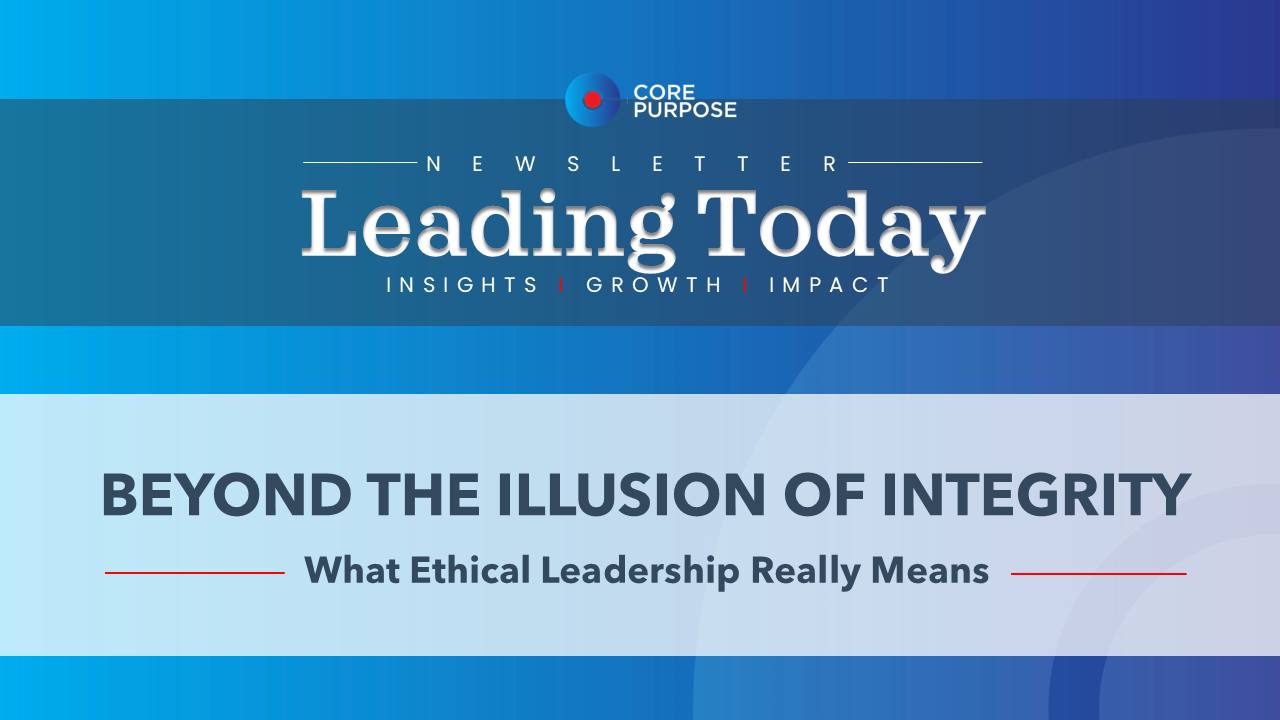Beyond Paychecks
Why Ethical Leadership is the Ultimate Employee Benefit
Leadership isn’t about authority, titles, or numbers—it’s about people. A workplace thrives or struggles based on the quality of experience team members have every day. A leader’s mindset, values, and ability to create a supportive, energising environment shape the culture of an organisation more than any policy or incentive ever could.
Think of two workplaces:
-
One where team members wake up dreading another day of pressure, micromanagement, and disengagement. They work out of fear, obligation, shame, or guilt—just enough to get by, but without any sense of purpose.
-
Another where team members feel energised, trusted, and inspired. They look forward to coming in, knowing their contributions matter, their growth is supported, and their leader values them as people, not just employees or workers.
Which environment do you think builds a strong company?
Leaders play a key role in shaping these experiences. While leadership comes with deadlines and bottom-line expectations, resilient and effective leaders know that empowered, inspired teams are the ones that perform at their best—without being driven by fear.

WHY ETHICAL LEADERSHIP
The word ethical matters. Leadership in itself is neutral—it simply means having influence. But the way that influence is used defines the culture of an organisation. Ethical leadership ensures that power is exercised with integrity, fairness, and a commitment to people, not just results.
You may have heard of Inclusive Leadership, Transformational Leadership, Servant Leadership, or Authentic Leadership. What sets ethical leadership apart is that it is the foundation upon which all other leadership models must rest. Without ethics, inclusion becomes performative, transformation becomes self-serving, and authenticity becomes selective. Ethical leadership ensures that all leadership decisions align with core values, respect for people, and long-term integrity.
It is about leading in a way that builds trust, sustains motivation, and fosters workplaces where people feel genuinely valued.
How Team Members Want to Feel After a Day’s Work
- Valued for their contributions
- Respected by their leaders and peers
- Motivated by meaningful work
- Secure in a culture of trust and fairness
- Energised rather than drained
How Leaders Want to Feel After a Day’s Work
- That their leadership made a difference
- Trusted and respected by their teams
- Confident that their decisions were fair and effective
- Supported rather than burdened
- Fulfilled, knowing they led with integrity
So why doesn’t it always happen like this? Because leadership isn’t just about getting things done—it’s about how things get done. When an organisation lacks clarity, trust, and leadership that prioritises people, team members disengage, leaders burn out, and company culture crumbles.
A paycheck may bring team members in the door, but it’s the work environment that makes them stay, thrive, or leave. That’s why ethical leadership that inspires is the ultimate team benefit.

CORE PRINCIPLES THAT SHAPE CULTURE
Great leadership is the foundation of a workplace where team members feel valued, engaged, and committed. It is built on:
- Leading by Example – When leaders take accountability, responsibility becomes the norm.
- Communication and Trust – Team members stay where they feel heard and respected.
- Setting Boundaries and Making Clear Decisions – Consistency and fairness prevent burnout and frustration.
- Resolving Conflict Constructively – Healthy workplaces don’t avoid conflict; they handle it with respect and clarity.
Why This Matters in Leadership
An organisation’s culture is shaped by the everyday actions of its leaders. Team members who work under strong, values-driven leadership experience:
- Higher trust – When leaders operate transparently, team members feel valued and secure.
- Greater engagement – Purpose-driven environments motivate team members beyond financial incentives.
- Lower turnover – People leave unhealthy cultures, not just jobs.
Some leaders may feel that focusing on these principles is unrealistic given their packed schedules. But the truth is, a team that feels empowered and aligned requires less oversight, takes more initiative, and solves problems proactively—reducing the daily burden on leadership.
Two Different Leadership Approaches
Some leaders focus primarily on results and authority, while others prioritise people and long-term success.
A leader who relies on authority and control may struggle to build trust and engagement. They might prioritise profits at the expense of people, avoid accountability, or seek short-term results without considering long-term impact.
By contrast, a leader who inspires through ethical leadership balances performance with people, builds trust through transparency, takes full ownership of outcomes, and commits to sustainable success.

ETHICAL LEADERSHIP IN ACTION
Trust-driven workplace cultures are linked to numerous positive outcomes. According to the MIT Sloan Management Review, high-trust environments result in employees being 50% less likely to seek new job opportunities. While specific statistics may vary, numerous organizations have reported significant improvements in employee retention and satisfaction after adopting ethical leadership practices. For instance, companies that prioritize ethical leadership often experience lower turnover rates and higher employee engagement. Honestivalues
The Impact of Strong Leadership
For Team Members: A workplace where respect, fairness, and trust are non-negotiable. For Leaders: A team that is engaged, high-performing, and invested in the company’s success. For Organisations: A reputation that attracts and retains top talent, saving millions in recruitment and training costs.
Leaders who fear they do not have the time to focus on culture should consider the cost of not doing so. Constantly dealing with disengaged team members, turnover, and internal conflict takes far more time and energy than creating an environment where people naturally contribute their best work.
How Leaders Can Develop These Skills
Here’s how leaders can integrate these principles into daily practice:
- Self-Awareness: Regularly assess whether decisions align with core values.
- Transparent Communication: Create a culture where honesty is the default, not the exception.
- Empathy-Driven Leadership: Prioritise people over processes.
- Boundaries and Fair Decision-Making: Say no when necessary to maintain integrity and avoid burnout.
Ethical leadership is not about perfection—it is about making conscious, consistent choices that benefit both team members and the organisation in the long run.

THE ETHICAL LEADERSHIP BLUEPRINT
This is exactly what The Ethical Leadership Blueprint trains leaders to do. It is not about theory—it is about action.
Want to create a workplace where team members want to stay, grow, and contribute? The Ethical Leadership Blueprint provides the structure, tools, and real-world strategies to make it happen.
The Ethical Leadership Blueprint isn’t just another leadership programme, it’s a structured transformation journey. It challenges you to shift your mindset, sharpen your skills, and apply real-world strategies that create measurable change.
✔ No fluff. No empty leadership clichés.
✔ Just bold, real, actionable leadership transformation.
Take the Next Step Is Yours
If you’re serious about leading with integrity and impact, this programme will equip you with the tools, mindsets, and frameworks to do just that.
📌 Explore The Ethical Leadership Blueprint and start creating a high-trust workplace today!
The Ethical Leadership Blueprint™ Group Coaching Programme
Until next time,
The 'Leading Today' Newsletter team at Core Purpose.

Further Reading & References
- Ethical Leadership and Employee Engagement
- International Journal of Environmental Research and Public Health – Ethical leadership significantly boosts employee engagement through self-efficacy and organizational commitment.
- Read more: pmc.ncbi.nlm.nih.gov
- The Power of Trust in Leadership
- MIT Sloan Management Review – Employees who trust their leaders are 260% more motivated and exhibit 41% lower absenteeism.
- Read more: sloanreview.mit.edu
- Trust-Driven Workplaces and Employee Retention
- MIT Sloan Management Review – High-trust workplaces result in employees being 50% less likely to seek new job opportunities.
- Read more: sloanreview.mit.edu
- The Impact of Ethical Leadership on Employee Engagement
- Honest Values – Companies that prioritize ethical leadership see lower turnover rates and higher employee engagement.
- Read more: honestivalues.com
- Creating a Culture of Trust and Well-being
- Thomson Reuters – Organizations that emphasize trust and well-being achieve higher profitability and resilience.
- Read more: thomsonreuters.com






Responses